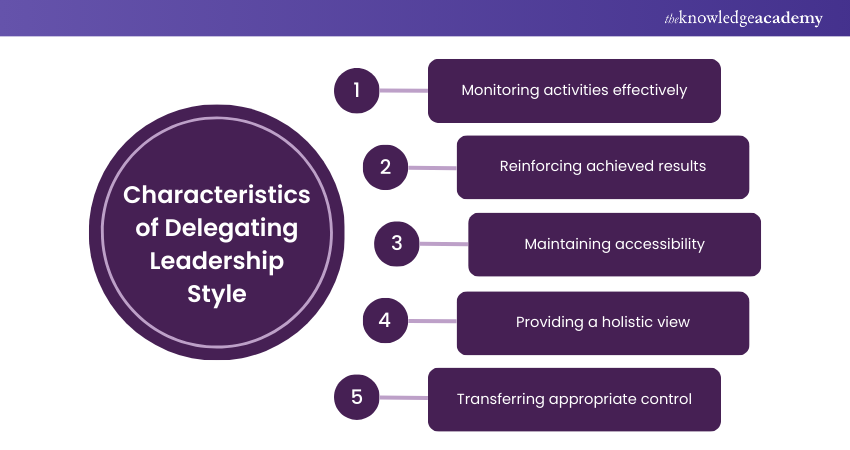We may not have the course you’re looking for. If you enquire or give us a call on +358 942454206 and speak to our training experts, we may still be able to help with your training requirements.
Training Outcomes Within Your Budget!
We ensure quality, budget-alignment, and timely delivery by our expert instructors.

In a low task and relationship behaviour approach, a Delegating Leadership Style is where Leaders empower an individual employee to exercise autonomy. It is most effective with a person who has all three qualities – confidence, competence, and will to perform.
Delegating Leadership Style helps employees to increase self-efficacy. With over eleven crore Leadership Styles, this one has emerged as a flexible approach. Providing employees with autonomy is a great motivator in the entire management canon. This blog will discuss every element you need to know about it.
Table of Contents
1) Definition of Delegating Leadership Style
2) How do you delegate effectively as a Leader?
3) Advantages of Delegation Leadership Style
4) Disadvantages of the Delegation Leadership Style
5) Characteristics of Delegation Leadership
6) Key indicators for implementing a Delegation Leadership Style
7) Conclusion
Definition of Delegating Leadership Style
Different Leadership Styles incorporate different methodologies, such as autocratic, situational transformational, and non-interference. Exploring situational leadership, specifically its delegation method, can help identify whether this approach might be very appropriate.
It can be defined as a Leadership approach that incorporates four unique Leadership Styles. This includes, telling, selling, delegating and participating. In Delegating Leadership Style a Leader empowers an individual to exercise a sovereign workflow. Practicing this approach offers an individual with the bigger picture, trusting them to deliver desired results.
This Leadership Style is crucial for a few reasons. One of the biggest reasons is that providing autonomy to an employee is a great motivation. Leaders engaging in every detail of the member’s work feel like micromanaging, which for many people seems offensive.
How do you delegate effectively as a Leader?
In order to delegate effectively as a Leader, a certain flow of events is necessary. Ideally, this is how the flow should look like:
1) Identifying candidates who are capable of taking on more work
2) Training them for the desired work and results
3) Providing context
4) Allowing them to practice in situations with low-pressure
5) Working with them alongside
6) Proper guiding
7) Taking a genuine interest in their career growth and development
Coaching and contextualising work are key elements of a Delegating Leadership Style. It deals with important pointers, such as, things that need to be done, possible ways of working them out, encouraging employees to find alternative paths, and explaining execution strategies. To strengthen this process further, there are a few additional aspects to consider:

a) Project check-ins: This process is easy due to several software these days. Setting employees up rather than pressurising them to complete tasks allows them some breathing space. Also, this procedure allows employees to understand projects in a better way, pinpoint pros and cons, and benefits and bugs.
b) Setting solid deadlines: This works as a framework or a structure. It helps you to understand what needs to be done and by when.
c) Approachable environment: Employees should feel comfortable coming to you whenever they face issues or need help with the project.
d) Avoid bottlenecks: If approvals are required for every minute detail, then you are micromanaging and acting as the bottleneck. This is not a Delegating Leadership Style.
Advantages of Delegating Leadership Style
Delegating Leadership Style comes with a set of advantages. It is a more flexible Leadership approach that promotes independent working, employee and employer relationships, and productivity. Listed below are some of those benefits:
Facilitates adaptable Leadership
The Delegating Leadership Style is a more flexible Leadership approach. It allows plenty of room to take up responsibilities and Leadership duties to benefit particular situations.
Encourages autonomy
It is a prominent aspect of a successful team known for its productivity. However, this can only happen if the members of the team are competent enough and have the necessary skills to operate autonomously.
Increase in productivity
By passing on more independence to the team, the time saved from micromanagement can be used for other work. This creates more efficiency and an increase in the rate of productivity.
Level up your management skills and knowledge with our Management Course!
Disadvantages of Delegating Leadership Style
Delegating Leadership Style, just like other Leadership Styles, is unsuitable for certain situations. It is quite natural for one Leadership Style not to work in all situations. Listed below are some of the disadvantages of this Leadership Style:
May lead to ambiguity
The transfer of Leadership roles and additional responsibilities can often create ambiguity amongst the team. This can especially happen during the initial days of the transfer. A great level of communication, however, can solve this issue.
Emphasises short-term objectives
This Leadership Style is comparatively more beneficial for a short-term situation. Which, necessarily, is not a bad thing. However, it does limit its benefits, turning focus from long term projects to short term deliverables.
Necessitates a skilled team
A major drawback of this Leadership Style is the requirement for an experienced team with extensive skills. If the team does not have the required skills to work independently, it can usually be improved by development programs.
Discover everything about team Leadership with our Successful People Management and Team Leadership Course.
Characteristics of Delegation Leadership
Let’s explore the characteristics of the Delegating Leadership Style:

Monitoring activities effectively
Delegating Leadership Style, even though it does not involve direct management intervention, is still a great idea to monitor activities. There is a fundamental difference between supervision and micromanagement. Micromanagement occurs when instructing and administering every minute detail of the process.
Whereas monitoring happens when you ensure individuals can deliver according to the necessary workflow. Monitoring helps with a system of information and insight into the ongoing work from the management’s perspective.
Reinforcing achieved results
Adapting the Delegating Leadership approach comes with the habit of engaging team members and Leaders and motivating them to achieve the best results. It might be achieved by showing appreciation for the team’s efforts and contributions, celebrating their success and maintaining a structure of positive outcomes.
Maintaining accessibility
While not getting directly involved in all the processes and allowing autonomy, it is still effective in being available for the team. It is always a good idea to be available to support in times of need. Answering questions, clarifying processes, and advising the team are some examples of being there for the team. It is extremely important at times of emergency, such as a sudden change in the plan of workflow and deliverable execution.
Providing a holistic view
When Delegating Leadership Style is practiced, it is important to provide the team with the bigger picture. This means - providing the employee with the overall situation, aim, strategies, and deliverables. The purpose behind this method is to ensure that they understand the purpose of their work and requirements.
Transferring appropriate control
The characteristic that almost defines this style of Leadership is transferring control. Essentially, this process includes transferring responsibilities and tasks.
Key indicators for implementing Delegating Leadership Style
The key factors that can be screened before implementing the Delegating Leadership Style are as follows:
1) Consistent and high-standard performance
2) Capable of functioning autonomously
3) The individual is committed to the work and enjoys it
4) Keeps higher management informed about work progress
5) Conveys both good and bad news
6) Is highly aware of the task and has skills to execute
Conclusion
The benefits of Delegating Leadership are straightforward. There is necessarily no perfect or ideal Leadership Style, as each has its own set of pros and cons. However, the Delegating Leadership Style is democratic, autonomous and flexible. Once you identify the requirements of your team, this Leadership approach works just fine.
Learn more about the power of Leadership with our Leadership Courses - join now!
Frequently Asked Questions

Factors that determine delegation include competency, job satisfaction, management and work culture, autonomous capability, and Leadership qualities.

Delegating is challenging for Leaders due to lack of communication, deadlines, work standards, and outcome expectations.

The Knowledge Academy takes global learning to new heights, offering over 30,000 online courses across 490+ locations in 220 countries. This expansive reach ensures accessibility and convenience for learners worldwide.
Alongside our diverse Online Course Catalogue, encompassing 17 major categories, we go the extra mile by providing a plethora of free educational Online Resources like News updates, Blogs, videos, webinars, and interview questions. Tailoring learning experiences further, professionals can maximise value with customisable Course Bundles of TKA.

The Knowledge Academy’s Knowledge Pass, a prepaid voucher, adds another layer of flexibility, allowing course bookings over a 12-month period. Join us on a journey where education knows no bounds.

The Knowledge Academy offers various Leadership Courses, including Communication Skills courses, Leadership skills training, Management courses, and Personal Development courses. These courses cater to different skill levels, providing comprehensive insights into Models of Team Leadership.
Our Business Skills Blogs cover a range of topics related to the Leadership approach, offering valuable resources, best practices, and industry insights. Whether you are a beginner or looking to advance your Leadership skills, The Knowledge Academy's diverse courses and informative blogs have you covered.
Upcoming Business Skills Resources Batches & Dates
Date
 Leadership Skills Training
Leadership Skills Training
Fri 27th Dec 2024
Fri 28th Feb 2025
Fri 11th Apr 2025
Fri 27th Jun 2025
Fri 22nd Aug 2025
Fri 24th Oct 2025
Fri 12th Dec 2025







 Top Rated Course
Top Rated Course



 If you wish to make any changes to your course, please
If you wish to make any changes to your course, please


